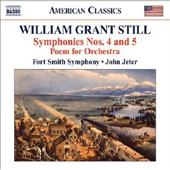
ESSENTIAL RECORDINGS

William Grant Still (1895-1978), was born to a family which had African-American, Native-American and European roots. His father,
according to some sources, was a college professor who died before William was born, and according to others, was a bandmaster who died when William
was three years old. His mother was a school teacher who wanted him to pursue medical studies, but his interest in music was strong enough for him to give up
medicine for composition. His two main composition teachers were at completely different ends of the spectrum. George Chadwick, the ultra-conservative, and
Edgar Varèse, the ultra-modernist. I'm surprised Still managed to establish his own style from such opposite influences. His music is a combination of
traditional, neo-romantic harmonies and forms, with an added blend of blues, spirituals and other folk influences.
His Symphony No. 5 'Western Hemisphere' opens this recording with a busy first movement, loaded with syncopated rhythms which build to a
march-like climax with an effective dramatic ending. The second movement, marked (Slower, and with utmost grace) is very imaginative, and displays
orchestration skills blending beautiful melodies in the strings flowing atop an orchestral pulse driving everything forward. The rest of the work is
full of color and energy, and the finale of the last movement has a kind of 'Gone With the Wind' feel to it.
The Poem for Orchestra which follows is a darker and more serious work depicting the world being reborn spiritually after a period of
darkness, and slowly builds to a bright and powerful ending with a sweeping melody.
The Symphony No. 4 'Autochthonous' represents the spirit of the various American people, and the coming together of different cultures.
It starts with a Native-American motif which slowly builds into a rousing march. Lots of melancholic episodes lead us to the slow final movement based on
a strong and flowing melody which builds to a powerful ending bursting with optimism. To me this work sounds like a blend of American traditional folk like
Stephen Foster, and the grand gestures of Grofé's 'Grand Canyon Suite', all built upon a subtle base of European tradition.
These two symphonies are given their world première recordings on this fine Naxos CD, and if I am not mistaking, this is only the second
recording by the Fort Smith Symphony Orchestra of Arkansas and their conductor John Jeter. Their first was actually more music by the same composer. This recording
is a strong new addition to the Naxos American Classics series, one of the most comprehensive series of recordings on the market today.
Jean-Yves Duperron